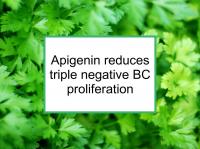Apigenin is a flavone found in a variety of leafy plants. Consumption of apigenin-rich foods is associated with reduced risk of breast cancer. Apigenin has been found to induce programmed cell death in hormone receptor positive (ER+/PR+), HER2-positive (HER2+), and triple negative (ER-/PR-/HER2-) breast cancer cells.
In addition, apigenin has been shown to significantly delay the development of progestin-accelerated mammary tumors in the rats, suggesting it could counteract the harmful effects of combined hormone replacement therapy (HRT) on breast cancer risk. Apigenin has also been shown to increase the effectiveness of radiotherapy and paclitaxel chemotherapy. Now a new study has demonstrated that apigenin induces favorable epigenetic changes in triple negative breast cancer cells, which serve to reduce proliferation and growth.
Epigenetic changes in breast cancer
Epigenetic changes are modifications in gene expression caused by heritable, but potentially reversible, modifications in gene expression such as changes in DNA methylation and microRNAs. In other words epigenetic changes are chemical modifications that turn our genes off or on without modifying the DNA sequence. These changes are common and can be induced by dietary and environmental factors.
Cumulative genetic and epigenetic alterations can transform normal breast cells into precancerous cells and finally into cancer cells. However, epigenetic changes can also serve to reduce the expression of genes associated with increased breast cancer risk and metastasis.
Sources of apigenin
Apigenin supplements are not recommended
Apigenin is a phytoestrogen whose interactions with breast cancer are still not well understood. Apigenin can act both as an estrogen and as an anti-estrogen depending on the dosage, and can actually stimulate the growth of estrogen receptor positive (ER+) breast cancer cells under some circumstances.
Apigenin has been found to have varying interactions with different types of chemotherapy. For example, one study reported that apigenin reduced the cytotoxicity of doxorubicin (thereby reducing its effectiveness), contradicting the results of other, more favorable, studies.
Apigenin supplements appear to have the potential to increase breast cancer risk and reduce the effectiveness of treatment. In addition, high doses of apigenin can cause liver damage. When apigenin is consumed as part of food, it is combined with other micronutrients that have been shown to act synergistically against breast cancer. Consuming apigenin-rich foods is safe and can potentially reduce breast cancer risk, increase the effectiveness of chemotherapy and radiotherapy, and reduce recurrence. On the other hand, safe and effective dosages of apigenin supplements have not been established. Based on the available evidence, compared to consuming it as part of foods in the diet, supplementation with apigenin appears to be unwise.
Food sources
Parsley, whether fresh or dried, is an excellent dietary source of apigenin, as is celery (especially green celery hearts). Artichokes, guava berries, garlic, bell peppers, and bok choy (Chinese cabbage) are also good sources. Apigenin is also found in mint, and chamomile, but there is not enough information concerning these foods to determine their overall influence on breast cancer risk. Sage is another dietary source of apigenin, but is on our list of foods to avoid.
Apigenin exerts its effects through epigenetic regulation
The study referenced at the beginning of this news story was designed to investigate the cellular mechanisms underlying the anticancer properties of apigenin (4΄,5,7-trihydroxyflavone) in triple negative breast cancer cells. The authors first demonstrated that non-toxic concentrations of apigenin reduced proliferation and induced cell cycle arrest in MDA-MB-231 breast cancer cells. In addition, apigenin delayed tumor growth in an animal model of breast cancer.
Testing showed that apigenin altered the expression of genes responsible for proliferation and cell cycle progression. For example, the authors demonstrated that apigenin increased acetylation of histone H3 in the p21WAF1/CIP1 promoter region, resulting in the increase of p21WAF1/CIP1 transcription.
The authors comment that the study findings demonstrate for the first time that apigenin exerts its anti-cancer effects through epigenetic regulation and can potentially be used in breast cancer prevention and treatment.
Please see our article on what triple negative breast cancer patients and survivors should eat for more information.
